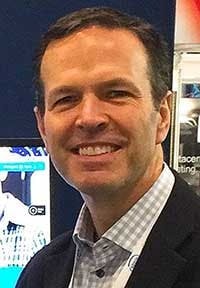Executive Insights: Jeff Klaus of Intel 2Q 2019
The Data Center Frontier Executive Roundtable features insights from industry executives with lengthy experience in the data center industry. Here’s a look at the insights from Jeff Klaus of Intel.
JEFF KLAUS, Intel
As General Manager of Intel Data Center Software Solutions, Jeff Klaus leads a global team that designs, builds, sells and supports Intel DCM, the only software that provides real-time, server-level data on the power and thermal conditions across a wide range of data center servers and other equipment. Provided as an SDK, Intel DCM middleware is integrated into Data Center Infrastructure Management (DCIM) consoles to increase data center power and thermal efficiency.
Since joining Intel in 2000, Klaus’ accomplishments have been recognized by multiple division awards. With a broad background in software solutions for the channel, client and SMB space, he has served as Director of Media Programs within Intel’s Digital Home Group, Entertainment Content Marketing Manager, Business Operations Manager, and Software Marketing Manager.
An accomplished speaker, Klaus has presented at such industry forums as Gartner Data Center Summit, AFCOM’s Data Center World, the Green IT Symposium, and the Green Gov conference. He has authored articles on data center power management in Data Center Post, IT Business Edge, Data Center Knowledge, Information Management and Data Centre Management. Klaus currently serves on the Board of Directors for the Green IT Council. Klaus earned his BS in Finance at Boston College and his MBA in Marketing at Boston University.
Here’s the full text of Jeff Klaus’ insights from our Executive Roundtable:
Data Center Frontier: After a year of blockbuster leasing in 2018, the large hyperscalers appear to be less active in procuring new capacity in the first half of 2019. What does the prognosis for hyperscale deals look like in the short and long term? Are these requirements changing in size or structure?
Jeff Klaus: Hyperscalers have continued their strong growth, it may have changed location but it’s still going strong. For example taken from Data Center Frontier:
Data center operators in Northern Virginia leased 270 megawatts of capacity in 2018, more than doubling the previous record for annual absorption, according to data from Jones Lang LaSalle, which said the region accounted for 55 percent of all data center leasing nationally.
I think prices have started to make people look for quality opportunities but things are still moving. For example:
Digital Realty… has purchased a 13-acre property on Filigree Court in Ashburn from Airbus Americas for $28 million, according to the Washington Business Journal, citing local property records. The purchase price works out to $2.14 million per acre, the highest price yet for a data center development property in Loudoun County.
Data Center Frontier: Edge computing is a trend with many layers and flavors. What types of edge computing are most relevant in 2019? What opportunities does the evolution of edge computing create for future data center infrastructure (and when)?
Jeff Klaus: In 2019 the edge use case I usually see is “High Bandwidth, Large Volume Applications.” For example
- Mobile HD video
- Autonomous driving
- Content delivery
- Healthcare (imaging and diagnostics)
- Caching and surveillance
Then followed by “Multi-access Edge Computing (MEC)
- Enterprise focused small cell services for stadiums and high-density locations
- Unified Customer Premise Equipment (uCPE) applications
- Retail
The next set of use cases after that are going to be moved up with 5G enabling a network for machines to talk to machines, and machines to talk to humans. We need the new networks to enable the amount of simultaneous connections all the devices require.
A wall of servers in an Intel data center in Santa Clara, Calif. (Photo: Rich Miller)
Data Center Frontier: The shift of enterprise IT workloads into third-party cloud platforms and colo facilities appears to be continuing. What strategies and services are proving most useful in working with enterprises in this transition?
Jeff Klaus: It’s always going to be a function of cost, and accessibility. Adding new features is great but there is so much change now it’s hard to set a strategy around an area of practice. I would say security is always top of mind and legislation. Enabling cloud consumers with tools to ensure compliance with the various government and corporate entities is always a winner.
Data Center Frontier: The rise of AI has boosted the use of new compute hardware to accelerate specific tasks, including GPUs, FPGAs, ASICs, TPUs and neural processing hardware as well as more powerful CPUs. How might the emergence of application-specific hardware impact data center design? What are the opportunities and challenges?
Jeff Klaus: I would put those more in the category of flexible hardware that can be purposed for a specific application, and it’s fantastic stuff that will always be sought for a strategic edge, but it’s going to continually be chased by other technology and software designs that intend on changing the use case. For example edge use cases and 5G could change the way we look at collecting and processing data that would then require more specialized hardware outside the datacenter (as opposed to inside the datacenter).
So really it’s best to say regardless we’re going to have a lot more data in the future, and we’ll need to count on Moore’s Law to give us tools to address it at a reasonable price point.
